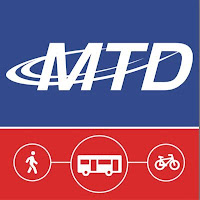WARNING: This post may use and link to references heavy on abbreviations and local government jargon. The Champaign County Regional Planning Commission has a handy abbreviation reference list (with agency names at the bottom) here.
At the last County Board meeting, there was a long explanation of the bureaucratic hurdles and timeframes that can undermine perfectly good projects. In this case, installing some public transportation shelters in Rantoul as part of the rural transit program here in Champaign County (jump to video link of the presentation here). The presenter who goes into great detail about the regulatory steps and timelines was Rita Morocoima-Black, Planning and Community Development Director at the Champaign County Regional Planning Commission (RPC).
RPC's website has a basic description of that function:
The Regional Planning program of RPC provides planning-related technical services to local governments throughout its service area. These services include a range of programs which address policy analysis, planning processes, demographic, economic, environmental and geospatial information analysis, and technical analysis. Most services are either contractual or funded and governed through intergovernmental agreements.
If one goes to the committees and meetings page of the RPC website, they'll find that the Regional Planning Commission is primarily made up of representatives of local governments: village presidents, mayors, the Champaign County Executive, etc. It has a long local history, especially with transportation planning, and now has multiple divisions and works to coordinate intergovernmental agreements and programs across the area.
You'll hear RPC mentioned a lot in local government meetings because it is often at the center of programs that run across government jurisdictions. This is, of course, a very common occurrence in any county dealing with local units of government, but especially in counties with "twin city" population centers.
You'll also hear the long RPC acronym for transportation planning thrown around a lot in this context: CUUATS. I'm pretty sure only the people who work at CUUATS (and not even all of them) can readily ramble off what it stands for with 100% accuracy. If you have to google it, every time, you're not alone. It stands for Champaign Urbana Urbanized Area Transportation Study and also has a long history within the RPC.
But the County Board Agenda said "Rural Transit Advisory Group"
This County Board presentation, for example, was a presentation on the Rural Transit Advisory Group, which was established by the county to oversee the collaboration between the Champaign County government and the MTD (local mass transit district) for County wide and rural services. In basic terms, the County gets public transportation funding for services around the County and works with MTD to provide many of the services.
In the complicated realm of federal grants, Illinois Department of Transportation regulations, and working across various local government bodies and transit districts, this is only one piece of the puzzle, however.
Rita Morocoima-Black wears many hats in this bureaucratic overlap. As a recent CUUATS agenda packet points out, she's variously listed as:
- Planning and Community Development Director for RPC (the overarching planning commission in Champaign County)
- Transportation Planning Manger for CUUATS (the transportation planning group within RPC)
- Also acting as bit of a liaison with the County's Rural Transit Advisory Group (RTAG).
At the heart of all this is transportation planning. In spite of all the acronyms, committees, and paperwork, this is all about connecting real funding to real transportation projects.
When you're dealing with federal, State, County, and local government bureaucracies all operating with their own tax bases, regulations, and authority, however there's not just simple agreement. The written agreements tend to establish a working relationship to protect the interests of everyone involved. They're often heavily scrutinized before and after, especially if voters or an interested party think any tax money was wasted or mishandled!
Staying Informed
Unless it's your job or you have a lot of time and coffee, the average voter couldn't possibly keep up with all of the details and meetings involved with just these organizations and related boards, committees, and groups. And that's just for the County's public transportation planning, funding and spending.
You have to choose your level of interest and commitment to this issue:
- If you simply follow the County Board meetings, you'll get very general updates from all of these commissions and groups from time to time. And that's probably enough for your average voter.
- If you're more generally interested in area transportation planning and budgets, you might consider going through the CUUATS Policy Committee (remember, the transportation planning group within RPC!) documents or even attending one of their meetings.
- And if you're extremely interested in public transportation policy within Champaign County, you can also follow the CUUATS Technical Committee meetings and documents as well as the MTD's own meetings and documents that include their C-CARTS program and even more glorious acronyms. The Champaign-County Area Rural Transit System or C-CARTS is a real public transportation system at the end of all this planning, funding, agreements, and appropriations.


No comments:
Post a Comment